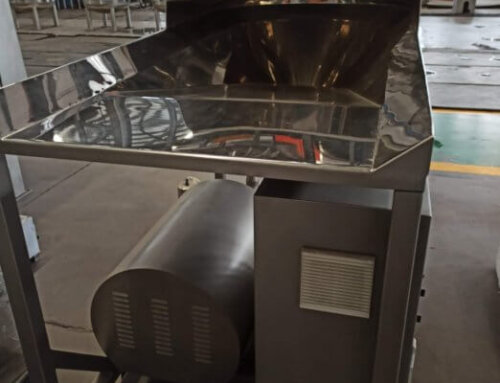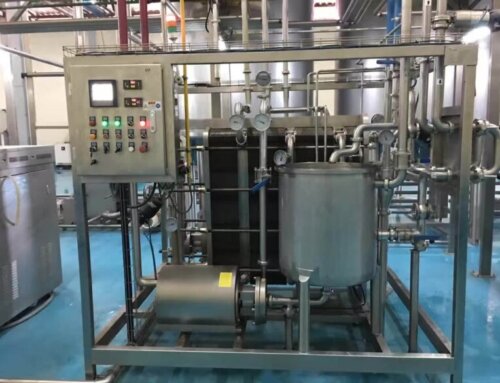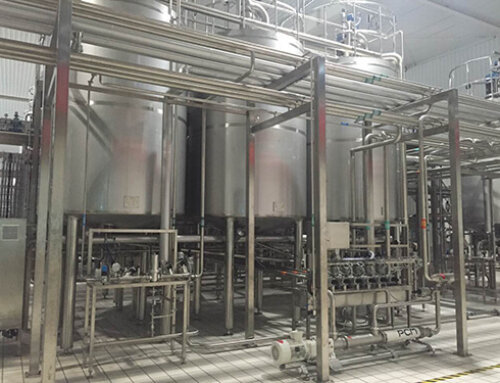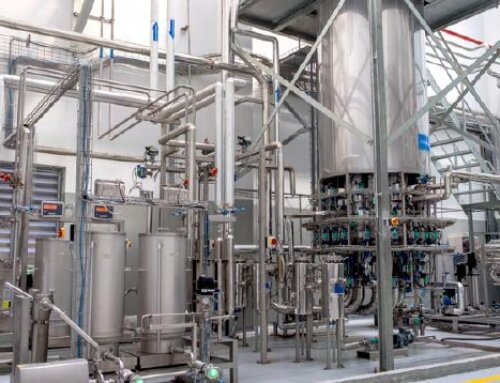Coconut Milk Processing Description
Coconut fruits are tropical fruits that are widely planted and proceed in South-East Asia and South Asia countries such as India, Philippines, Vietnam, Sri Lanka, Thailand, Malaysia, Indonesia, Some African countries(Nigeria, Ghana) and Central American countries(Dominica, Belize). The fresh coconuts in these countries proceed in all kinds of products including coconut milk, coconut water, coconut oil, and desiccated coconuts products, among these products, coconut milk is one of the most popular drinks from fresh coconuts due to its high protein, vitamin and trace elements.
Coconut milk products are proceeded by preparing a large quantity of finely ground coconut meat and extracted, where most solids, fibers and residues are separated and filtered, with or without additional water and flavors, thermally processed appropriately and packed in a container for direct consumption or retailing use.
The fresh coconut meat can proceed into light coconut milk(5%-7% fat content), medium coconut milk(10%-20% fat content), high-fat coconut milk (20%-30% fat content), and coconut cream (30%-40% fat content) according to the end products fat content, the desired fat content coconut milk can be diluted by RO pure water during processing.
The coconut milk processing machines are involved in coconut meat washing and blanching equipment, coconut meat grinding and expelling machine, coconut milk extracting machine, coconut milk filter and separator, coconut milk formulation, homogenizing, degassing and pasteurizing/sterilizing machine, coconut milk filling and packing machine, CIP cleaning plant, RO water system. All the coconut milk processing machines are made of food-grade SUS304 material.
Thanks to our R&D department for designing a reasonable and highly efficient coconut milk production process, The whole coconut milk processing plant can greatly save energy such as water and steam to help our client to reduce the operating cost.
The coconut milk processing capacity is from 500L per hour to 10000L per hour and the end coconut milk products can be packed into various containers such as bottles, metal cans, aseptic bags, aseptic cartons, or pouches according to client’s different requirements.
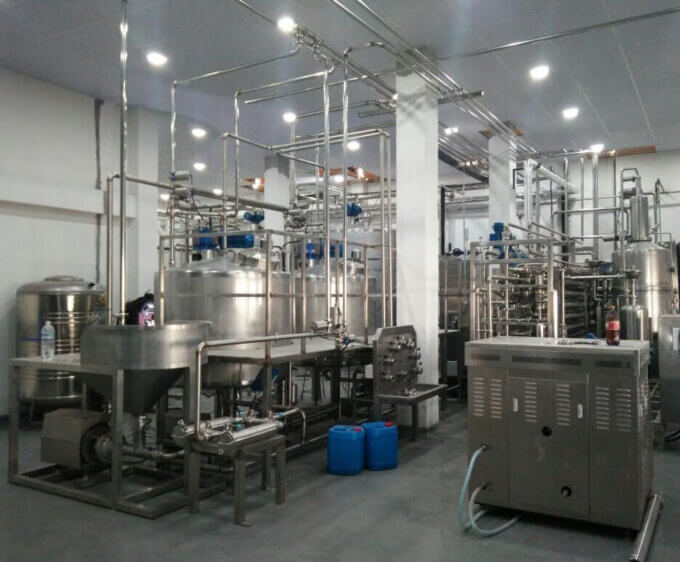
Coconut Milk Production Process Flowchart
Fresh coconuts after dehusking, deshelling, the coconut meat will be obtained. Then the fresh coconut meat will be blanched or precooked by hot water or steam and fed into the drum washing machine for washing. The clean coconut meat will be ground into small particles and fed into the extractor to obtain the coconut milk. Then the filters will be applied to remove the solids and fibers in coconut milk. To avoid coconut milk deterioration, the milk will be pre-pasteurized and stored in the insulation tanks for the next formulation and standardization. After the coconut milk is mixed with other ingredients according to the recipe, will be homogenized, pasteurized/UHT sterilized and degassed. Finally, the coconut milk will be packed into the containers.

Coconut Milk Processing Machine Introduction
Coconut meat blancher and washer
The fresh coconut meat will be blanched in 85℃-100℃ hot water for 3-5 minutes. After blanching, the bacteria of coconut meat will be greatly reduced and the enzyme will also be inactivated to increase the yield rate in later coconut milk extraction process. The coconut meat blanching process can be done in an air bubble washing machine, so the coconut meat has a cleaning effect in the process of blanching. After blanching and first-stage washing, the coconut meat will be fed into the drum washing machine for the second-stage washing. In the drum washing machine, the coconut meat is washed by high-pressure water spraying through the rotation of the drum.
Coconut meat grinding and extracting machine
The cleaned coconut meat is reduced in particle size by a grinding machine to prepare for more efficient coconut milk extraction. The coconut meat is fed into the coconut meat grinding machine hopper, then the sharp blade in the coconut grinding machine rotates at a high speed to chop the coconut meat into 3-5mm small particles, the chopped coconut flakes will be collected into the hopper and screw transferred to the coconut milk extractors.
For coconut milk extraction, the double screw press or belt press are the most commonly used for the first extraction. To increase the yield rate and extraction efficiency, during coconut milk extraction, the barrel type hydraulic press will be used for the second extraction of the coconut milk, the desiccated coconut from first extractors will be transferred to one recombined tank, where the RO pure water is usually dosed into the tank, and then the coconut mash and water mixture will be pumped to the barrel type hydraulic press for the second extraction. After coconut milk is extracted, the milk will be collected and stored in a SUS304 tank and then one sieve screen and dual bucket filter can be applied to remove the fiber and solids in coconut milk.

Coconut milk pre-pasteurizing and batch storage tank
In higher capacity coconut milk processing plants, The coconut milk will be pre-pasteurized by a plate pasteurizer, and the pasteurizing process is 75-80℃ for 60S and cooled down to 5-10℃, then the milk will be pumped into insulation sanitary SUS batch tanks for storage.
In a small-scale coconut milk processing line(500L-1000L per hour), the coconut milk after being filtered can be cooled down to 5 ℃directly by a plate cooler and stored in insulation tanks. And with this case, the milk in batch tanks must be finished processing in 6-8 hours.

Coconut milk mixing/blending tanks system
The end coconut milk flavor, viscosity, color and mouth feel will be fixed in the mixing tank. So the blending process is also a crucial process in coconut milk processing plants.
The ingredients such as vitamins, acid, sugar, and flavors can be dissolved into the liquid phase in the high-speed emulsification tank and then pumped into the blending tank to mix with the coconut milk and water. Then the paddle stirring agitator with 0-60rpm in blending tanks will start to mix all ingredients gently and evenly to form the final coconut milk products.

Coconut milk high-pressure homogenizer and degasser
The main purpose of the homogenizer is to create a uniform and stable emulsion by breaking down the fat globules in the coconut milk to prevent separation and enhance the product’s texture and consistency. The two-stage 40Mpa-60Mpa high pressure is exerted on the coconut milk products.
The homogenizing sequence is also crucial: When making the aseptic coconut milk products, the coconut milk will be UHT heat treatment, then homogenized with an aseptic homogenizer at 60-70℃; For the non-sterile products, the coconut milk will be homogenized firstly, then pasteurized/sterilized.
Coconut milk sterilizer and filler
Coconut milk heat treatment and the filling process are highly related. Here introduce the most 3 common sterilizing and packing types used in industrial coconut milk processing:
- Pasteurized chilled coconut milk: The coconut milk will be pasteurized at 75-85℃ for 15-120S by plate pasteurizer, this kind of coconut milk usually can be 3—5℃ filled into glass bottles, PET bottles, gable top cartons, metal cans or pouches. The shelf life of this product is one week refrigerated.
- Pasteurized frozen coconut milk/cream: After the coconut milk is extracted and pasteurized, the end products can be filled and packed into soft bags, then the coconut milk in soft bags will be frozen to -18℃ by the blast freezer for storage and distribution; The shelf life of this product can reach 12-18 months.
- In-container sterilization: The coconut milk does not need to do heat treatment before filling, after the coconut milk is filled into containers such as glass bottles, metal cans or pouches, the package will be sent to a retort sterilizer for 121℃ 20-30min heat treatment. The end product has a shelf life of 1-2 years at ambient temperature.
- UHT sterilized aseptic coconut milk: Coconut milk will be UHT sterilized at 137-145℃ for 4-6S by direct DSI or indirect UHT sterilizer, then the products will be aseptically filled into aseptic cartons, aseptic bags or PET bottles at room temperature. The shelf life is about 6-8 months with this processing technology. Now the DSI sterilizer is more and more popular for heat treatment of coconut milk products especially for the fat content with 22%-24% due to its fresher product quality and light color.



